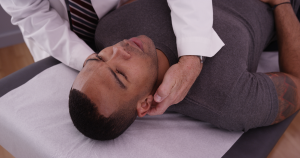
Photo by Rocketclips, Inc. for Shutterstock
Nothing can be more jarring for a parent or a loved one than awaiting a traumatic brain injury diagnosis. TBIs often happen in the blink of an eye, setting a person up for ongoing challenges as they move forward through life. Traumatic brain injuries can occur as the result of a car accident, an athletic injury, or even a bike accident without a helmet. Should a loved one encounter an injury, it’s crucial to know the signs of a TBI in order to provide the survivor with the appropriate medical attention.
Mild Traumatic Brain Injuries
Mild traumatic brain injury is a condition that requires medical attention. Concussions are an example of a mild TBI; they can range in severity and are especially common in athletes. Surprisingly, mild traumatic brain injuries may not fully present themselves for weeks after the impact occurs. They can affect people physically, cognitively, and sensorially. Physical signs to be on the lookout for include: loss of consciousness, confusion, headache, nausea and vomiting, dizziness that affects balance, fatigue, and issues with speech. In terms of cognition, be observant of mood swings that are uncharacteristic, memory issues, problems with concentration, anxiety, and observed feelings of depression. Lastly, mild traumatic brain injuries can affect people sensorially, causing someone with a mild TBI to be sensitive to light and sound, have blurry vision, experience ringing in the ear or hearing complications, and even notice issues with their sense of smell.
Moderate to Severe Traumatic Brain Injuries
Moderate to severe traumatic brain injuries are, as expected, even more concerning than mild TBIs; the survivor often has a long-term recovery ahead of them, both mentally and physically. This range of TBI is recognized as serious right away. Signs can include: the loss of consciousness for minutes to hours, vomiting that does not cease, coordination issues, seizures or convulsions, clear fluids coming from the ears or nose, and more. The mental symptoms can be even more frightening; someone you know and love can be unusually obstinate, extremely confused, unable to speak correctly, or even comatose. If you witness or experience any of these symptoms, it’s imperative that you get medical attention as soon as possible. Babies and younger children cannot express many symptoms that can be recognized easily in adults; if an accident occurs and they suffer an injury to their head, they should be taken to a hospital regardless of their visible physical condition.
If You Receive a TBI Diagnosis, Join TryMunity Today
If you or someone close to you endures a traumatic brain injury, there are undoubtedly concerns about what happens next. Every person is different and will require different steps during their recovery process. But, you should never feel alone on your journey. TryMunity was created to serve as an outlet and means of connecting people living with TBIs across the nation. Join this online community today by visiting http://community.trymunity.com/.



